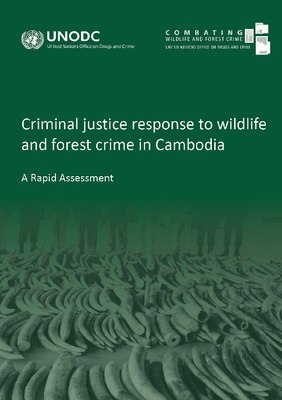Criminal Justice Response to Wildlife and Forest Crime in Cambodia: A Rapid Assessment

Author(s): UNODC Regional Office for Southeast Asia and the Pacific
Publication Date: 2015
DOWNLOAD FILEA 2015 rapid assessment by the UN Office on Drugs and Crime on the status of Cambodian criminal justice response to wildlife crime.
Key Points in Document:
- A 2015 rapid assessment by the UN Office on Drugs and Crime on the status of Cambodian criminal justice response to wildlife crime.
- Information for the assessment was compiled from structured interviews and literature reviews of publications, articles, and government documents.
- The assessment contains an overview of national legal frameworks, a review of eight sectors of law enforcement authorities, advanced investigative techniques, inter-Agency cooperation, strengths and weaknesses of environmental law agencies, and conclusions and recommendations for the country.
- The objective of the assessment “to analyse the role of the criminal justice system in combating the illegal trade in timber and wildlife with a view to engage the Government of Cambodia to improve its performance.”
- Conclusions of the rapid assessment include:
- Corruption in forest and wildlife agencies represents a risk to effective governance.
- Despite substantial penalties for environmental crime, little evidence exists that penalties are imposed, likely due to low capacity for prosecutors and judges.
- Inadequate communication and collaboration between related agencies contributes to information silos.
- Recommendations from the assessment are given both in the short- and medium-term for capacity building and include, among many other recommendations:
- In the short-term:
- Create an Environmental Court for judges and prosecutors to develop specialized knowledge;
- Increase training for border officials, park rangers, and police on offences, surveillance, evidence management, and interview techniques
- Provide proper equipment, training, and staffing to support all environmental crime agencies;
- In the medium-term:
- Increase use and capacity for geospatial intelligence systems
- Establish a pilot program for drone use in detecting environmental crime
- Establish a computerized intelligence system for use by all agencies.
Citation: UNODC Regional Office for Southeast Asia and the Pacific. Criminal Justice Response to Wildlife and Forest Crime in Cambodia: A Rapid Assessment. Bangkok, Thailand; 2015. doi:10.1007/s13398-014-0173-7.2.

